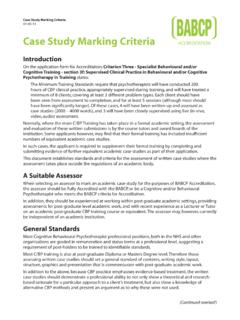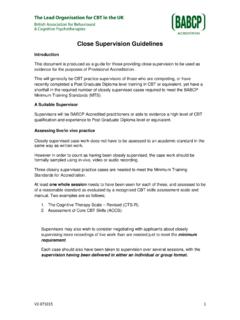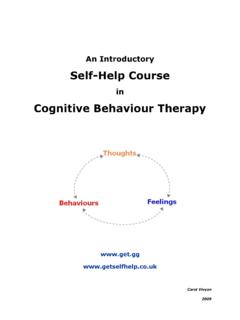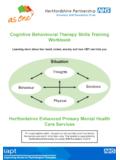Transcription of What is CBT? - BABCP
1 what is CBT? Overview cognitive Behaviour therapy (CBT) is a talking therapy . It can help people who are experiencing a wide range of mental health difficulties. what people think can affect how they feel and how they behave. This is the basis of CBT. During times of mental distress, people think differently about themselves and what happens to them. Thoughts can become extreme and unhelpful. This can worsen how a person feels. They may then behave in a way that prolongs their distress. CBT practitioners help each person identify and change their extreme thinking and unhelpful behaviour. In doing this, the result is often a major improvement in how a person feels and lives. cognitive and behavioural psychotherapies are a range of therapies based on concepts and principles derived from psychological models of human emotion and behaviour.
2 They include a wide range of treatment approaches for emotional disorders, along a continuum from structured individual psychotherapy to self-help material. Theoretical Perspective and Terminology cognitive Behaviour therapy (CBT) is one of the major orientations of psychotherapy (Roth & Fonagy, 2005) and represents a unique category of psychological intervention because it derives from cognitive and behavioural psychological models of human behaviour that include for instance, theories of normal and abnormal development, and theories of emotion and psychopathology. Behaviour therapy , the earliest of the cognitive and behavioural psychotherapies, is based on the clinical application of extensively researched theories of behaviour, such as learning theory (in which the role of classical and operant conditioning are seen as primary).
3 Early behavioural approaches did not directly investigate the role of cognition and cognitive processes in the development or maintenance of emotional therapy is based on the clinical application of the more recent, but now also extensive research into the prominent role of cognitions in the development of emotional disorders. The term cognitive -Behavioural therapy (CBT) is variously used to refer to behaviour therapy , cognitive therapy , and to therapy based on the pragmatic combination of principles of behavioural and cognitive theories. New CBT interventions are keeping pace with developments in the academic discipline of psychology in areas such as attention, perception, reasoning, decision making etc. what is CBT?
4 cognitive and/or behavioural psychotherapies (CBP) are psychological approaches based on scientific principles and which research has shown to be effective for a wide range of problems. Clients and therapists work together, once a therapeutic alliance has been formed, to identify and understand problems in terms of the relationship between thoughts, feelings and behaviour. The approach usually focuses on difficulties in the here and now, and relies on the therapist and client developing a shared view of the individual s problem. This then leads to identification of personalised, usually time-limited therapy goals and strategies which are continually monitored and evaluated. The treatments are inherently empowering in nature, the outcome being to focus on specific psychological and practical skills ( in reflecting on and exploring the meaning attributed to events and situations and re-evaluation of those meanings) aimed at enabling the client to tackle their problems by harnessing their own resources.
5 The acquisition and utilisation of such skills is seen as the main goal, and the active component in promoting change with an emphasis on putting what has been learned into practice between sessions ("homework"). Thus the overall aim is for the individual to attribute improvement in their problems to their own efforts, in collaboration with the psychotherapist. cognitive and/or behavioural psychotherapists work with individuals, families and groups. The approaches can be used to help anyone irrespective of ability, culture, race, gender or sexual preference. cognitive and/or behavioural psychotherapies can be used on their own or in conjunction with medication, depending on the severity or nature of each client s problem. Titles and Levels of Practice cognitive and/or Behavioural Psychotherapists are usually health professionals such as specialist mental health nurses, psychologists, psychiatrists, general practitioners, social workers, counsellors or occupational therapists who have received additional cognitive and/or behavioural therapy training and supervision (see Appendix 1 for an outline of the skills required by a CBT therapist).
6 Whilst all cognitive and behavioural psychotherapists share the above principles, individual therapists may call themselves by different titles. The title used may reflect the theoretical underpinnings of the specific therapy delivered ( "behaviour therapist" if therapy is based on the principles of learning theory, " cognitive therapist", if therapy is based on the principles of a cognitive model of emotional disorders), but more often the term " cognitive behaviour therapist" is used by practitioners, referring to therapy based on either cognitive or behavioural principles, or a combination of these. The terms "psychotherapist" and "therapist" or "psychotherapy" and " therapy " are used synonymously. Whatever title they use, the approach is commonly referred to as CBT.
7 There are different levels of the practice of CBT, which require very different skill levels on the part of the person talking to the "client". 1. Formulation driven CBT (individual or group CBT for a range of people and problem areas) This is a form of psychotherapy, the clients are not able to help themselves and have sought help from a trained professional and require expert interventions from an appropriately trained and supervised CBT psychotherapist. The relationship between the therapist and the client is paramount and expert skills are required to engage the client in a therapeutic alliance. Once this is established therapy can proceed collaboratively through assessment, formulation and intervention. The therapist using various cognitive and/or behavioural techniques as appropriate.
8 They would evaluate the efficacy of any intervention and change tack if necessary. 2. CBT approaches - Specific CBT interventions for specific problem areas ( concordance training; relapse prevention work in people with a diagnosis of Schizophrenia; identification of symptoms and specific CBT intervention in post-partum depression; anger management groups, anxiety management groups, pain management etc). This is not a form of psychotherapy as the health workers are implementing a technical intervention, they are not required to formulate and adapt the treatment. The health workers will have received training in specified CBT interventions for particular problem areas, and should be receiving supervision from a CBT psychotherapist. 3. Assisted self-help (computerized CBT, self-help material presented to a support group or individuals by a health worker, such as a graduate mental health worker or assistant psychologist) This is not a form of Psychotherapy and only limited, if any, formal CBT skills or training are required by the individual introducing the approach, such individuals should not be claiming that they are doing CBT.
9 4. Self-help (books, bibliotherapy) This is not a form of psychotherapy and no CBT skills or training are required by the individual reading the self-help material. Although there is some evidence for the efficacy of CBT approaches at many different levels, from now on for the purposes of this document, when the term "CBT" is used, we are referring to CBT psychotherapy outlined in level 1 above. The Evidence Base for CBT Treatment interventions are predicated on a robust evidence base derived from studies utilising randomised controlled and single-case methodologies that have demonstrated the efficacy and effectiveness of cognitive and behavioural psychotherapies in the treatment of common mental health problems, including the anxiety disorders, generalised anxiety, panic, phobias, obsessive-compulsive disorder, posttraumatic stress disorder, bulimia and depression as identified by a host of recent reviews by NICE, SIGN and other review bodies.
10 CBT models have also been developed for use in an increasing range of mental health and health difficulties including severe and enduring mental health problems, such as psychosis, schizophrenia, bi-polar disorder, anger control, pain, adjustment to physical health problems, insomnia and organic syndromes, such as early stage dementia. There is an extensive research base around behavioural approaches in working with children and people with learning disabilities, severe and enduring mental health problems and "challenging behaviour" generally. More recently CT and CBT have become the treatments of choice for adolescent depression, and for use with children and in intellectual disability (learning disability). Research into the contribution of psychological factors to physical health problems (such as low back pain, chronic fatigue, recovery from surgery for example) is growing and has led to the development of CB approaches in these areas.

















